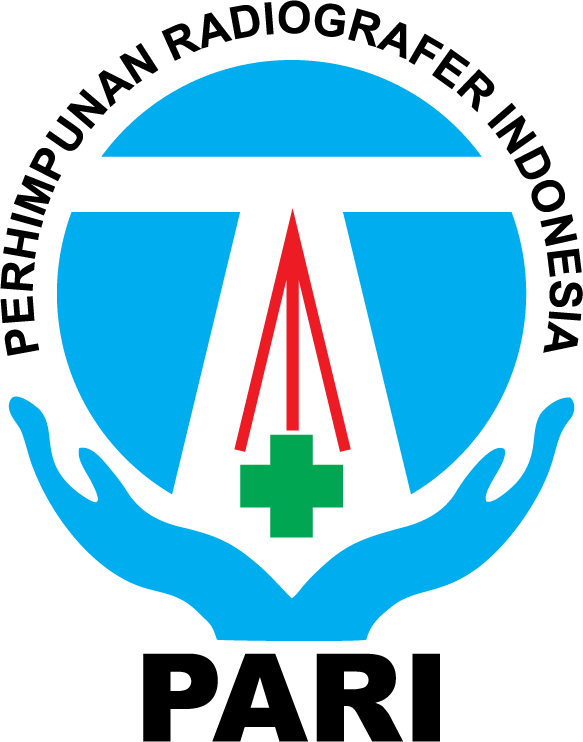Informasi Diagnostik Pemeriksaan Appendikografi Oral dan USG dalam Menegakkan Diagnosis Appendisitis
Abstract
Background: Patients with suspected appendicitis are always asked by the sending doctor (Pediatric Surgeon) to ask for an oral appendicography examination without seeking other investigations such as ultrasound or CT scan. Whereas in the oral appendicography examination, false negative often occurs so that the patient is exposed to radiation several times until the barium reaches the caecum area and no more barium is still in the small intestine. Compared to the oral appendicography examination, ultrasound examination is easier in patient preparation, cheaper in terms of cost and more safety against the dangers of X-ray radiation.
Methods: This research is a descriptive analytic study conducted with a cross sectional approach. The study was conducted by providing interventions for ultrasound examination before carrying out an oral appendicography examination. Ultrasound examination of the appendix is an examination using ultrasound waves with a frequency of 5-7.5 MHz or 2-4 MHz to diagnose appendicitis. Oral appendicography examination is a radiological examination to confirm the diagnosis of appendicitis using 100 grams of barium sulfate contrast medium diluted to a volume of 200 ml that is administered orally.
Results: Diagnostic information obtained on oral appendicography examination of suspected appendicitis in radiology department Roemani Hospital, among others, can show the presence of calcification and the length of the appendix organs can be measured. Diagnostic information obtained on ultrasound examination of suspected appendicitis, among others, can show the presence of debris (pus), can evaluate the thickness of the intestinal wall and its vascularity.
Conclusion: Ultrasound examination for suspected appendicitis is the first choice in diagnosing appendicitis than oral appendicography because it can be done in a faster, safer, more convenient and non-invasive manner and the cost of ultrasound is cheaper than oral appendicography.
Keywords
Full Text:
PDFReferences
Al-Khusheh, M., Iqbal, S. J., Gupta, A., Asalieh, H., Khalifa, K., & Habeeb, K. (2011). The Role of Abdominal X-Rays in The Investigation of Suspected Acute Appendicitis. Journal of Medicine and Medical Sciences, 2(11). Retrieved from https://www.interesjournals.org/abstract/the-role-of-abdominal-xrays-in-the-investigation-of-suspected-acute-appendicitis-18055.html
Avanesov, M., Wiese, N. J., Karul, M., Guerreiro, H., Keller, S., Busch, P., … Yamamura, J. (2018). DiagnosticPrediction of Complicated Appendicitis by Combined Clinical and Radiological Appendicitis Severity Index (APSI). European Radiology, 28(9). https://doi.org/10.1007/s00330-018-5339-9
Baresti, S. W., & Rahmanto, T. (2017). Sistem Skoring Baru untuk Mendiagnosis Apendisistis Akut. MAJORITY, 6(3), 169–173. Retrieved from https://juke.kedokteran.unila.ac.id/index.php/majority/article/view/1130
Bontrager, K. L., & Lampignano, J. P. (2014). Textbook of Radiographic Positioning and Related Anatomy (8th ed.). 8th ed. St. Louis, Mo: Elsevier/Mosby.
Gaitini, D. (2011). Imaging Acute Appendicitis: State of The Art. Journal of Clinical Imaging Science, 1(1). https://doi.org/10.4103/2156-7514.85778
Hasya, M. N. (2012). Reliabilitas Pemeriksaan Appendicogram dalam Penegakan Diagnosis Apendisitis di RSUD Dr. Pirngadi Medan Periode 2008-2011 (Universitas Sumatera Utara, Medan). Retrieved from http://repository.usu.ac.id/handle/123456789/31374
Majdawati, A. (2007). Peningkatan Visualisasi Appendix dengan Kombinasi Adjuvant Teknik Pemeriksaan Ultrasonografi pada Kasus Appendicitis. Mutiara Medika, 7(1), 58–71. https://doi.org/https://doi.org/10.18196/mmjkk.v7i1%20(s).1686
Rettenbacher, T., Hollerweger, A., Macheiner, P., Rettenbacher, L., Frass, R., Schneider, B., & Gritzmann, N. (2000). Presence or Absence of Gas in The Appendix: Additional Criteria To Rule Out or Confirm Acute Appendicitis - Evaluation With US. Radiology, 214(1). https://doi.org/10.1148/radiology.214.1.r00ja20183
Sander, M. A. (2011). Apendisitis Akut: Bagaimana Seharusnya Dokter Umum dan Perawat Dapat Mengenali Tanda Dan Gejala Lebih Dini Penyakit Ini ? JURNAL KEPERAWATAN, 2(1), 15–20. Retrieved from https://doi.org/10.22219/jk.v2i1.479
DOI: https://doi.org/10.31983/jimed.v7i1.6651
Article Metrics
Refbacks
- There are currently no refbacks.
JURNAL IMEJING DIAGNOSTIK by http://ejournal.poltekkes-smg.ac.id/ojs/index.php/jimed is licensed under a Creative Commons Attribution-ShareAlike 4.0 International License. Statcounter

.png)
.png)
.png)
.png)
.png)
.png)
.png)











